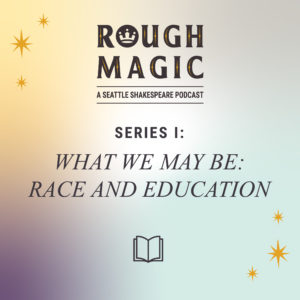

What We May Be: Race and Education
A 4-episode podcast diving into the intersections between race, education, and Shakespeare through interviews with artists, educators, and students. Hosted and produced by Rafael Molina, this podcast features interviews with Valerie Curtis-Newton, Rosa Joshi, Lamar Legend, Sara Porkalob, Desdemona Chiang, QuiQui Dominguez, Sunam Ellis, Dedra Woods, Manny Cawaling, and more. Through transparent conversations about social justice, education, and Shakespeare—and examinations both macro and micro—we hope you will be inspired to actively decolonize, restructure, and create accountability in theatrical education.
Hello, “What We May Be: Race and Education” is the new podcast from Seattle Shakespeare Company. This series as a four-part special premiere of Seattle Shakespeare Company’s podcast, Rough Magic. It’s also a fundraiser for the educational department at Seattle Shakes. I’m Raphael Molina. I’ll be your host for these explorations and conversations about the relationship between race, education, Shakespeare, and our community here in Seattle. Every episode will feature various interviews with community educators, students, and artists. With the goal being that you, the listener will gain a better understanding of how race and power play into the politics of education. And as a community, we can dream of more ways to actively de-colonize restructure and create accountability. Here’s a sneak peak,
We’re all human. We’re all part of the human experience. And part of that is art and creativity. Information has value. And how do we compensate those who generate it, but not punish those who receive it? Well, you know, again, I go back to the arts, you have to know your audience, right? And if we stop treating our students as consumers and treat them more like audience, we’ll do a better job of meeting them where they are. So those are things. When we think about education, we can’t just think about, you know, what’s in the books. We have to think about how are we educating these humans to really have, empathy? This story is, is your story. And in fact, your version of this story only enhances his version of his story in the way that he wrote it. I’m really drawn to the history plays because they, in terms of choosing content, because they really speak to the nature of leadership and the characteristic of leadership. And I think in a democracy, you always need to be examining and questioning who our leaders are, and what we want from our leaders, what we can forgive and what we must not forget. And if I think, I think if our leaders don’t want it, then I’m so sorry. …leaders who have some skills you’re not needed anymore, that you, we don’t need you. You are actually hurting us. Please leave. And I think it’s important, especially for white people in positions of influence. I don’t necessarily want to say power, but maybe power too, to think about this stuff they maybe haven’t had to think about before, you know. Here we are, what can we learn from one another? What can we unlearn together?
Like what you hear? Subscribe wherever you get this podcast from and join us for What We May Be.
